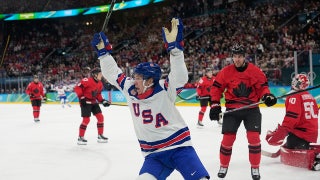NEW YORK – Major League Baseball and the players' union announced Tuesday the signing of a new collective bargaining agreement, extending the league's unprecedented run of labor peace through 2016.
"I am thrilled for the fans that the clubs and the players of Major League Baseball, together, have the opportunity to further build on our game's unprecedented popularity," Commissioner Bud Selig said.
The smooth negotiations marked a stark contrast to the recent labor strife in the NFL, NBA and NHL, and signaled the continuing of a new era in MLB after decades of rancor between the owners and players. Nine baseball seasons were affected by a strike or lockout from 1972-95, with the last coming in 1994 when a strike abruptly ended the season in August.
The biggest addition to the labor deal is the blood-testing of players for human growth hormone (HGH). MLB said starting in spring training players will be subject to an HGH test "for reasonable cause" during the year.
A failed test would result in a 50-game suspension, but there will be no random in-season tests next season. The sides will meet during the season to determine how blood testing affects players' energy levels.
The new deal is the first to be negotiated by new MLB Players Association executive director Michael Weiner, who was promoted to replace Donald Fehr in Dec. 2009. Weiner had been involved in previous negotiations as the union's top counsel.
"This is a good day for baseball and a good day for collective bargaining," Weiner said, touting the "quality of the agreement that has been reached."
It also marks the last negotiation for Selig, who has said he will retire when his contract ends after the 2012 season.
Selig announced last week that the deal would officially move the Houston Astros to the American League West in 2013 following the franchise's purchase by Houston businessman Jim Crane. The move evens the leagues at 15 teams apiece.
Selig also announced the new labor deal would add a second wild card spot in each league as early as next season. Selig said the league intends to hold a one-game playoff in each league between the top wild card finishers to determine the final postseason berths.
The new deal also moves to prevent players from skipping the All-Star Game, an issue that has rankled fans in recent years.
The agreement states that "participation in the All-Star Game will be required unless the player is unable to play due to injury or excused by the commissioner."
Instant replay, which is currently used on questionable home run calls, will be expanded to include fair-or-foul calls and "trapped ball" catches.
The new agreement raises the minimum player salary from $414,000 to $480,000 in 2012, with the sum escalating to $500,000 over the life of the five-year agreement.
The deal keeps in place the luxury tax on teams with the highest payrolls, with the resulting revenue shared among the other clubs. The threshold was $178 million in 2011.
The only team above that threshold was the Yankees, with a payroll of $202.7 million. The Phillies came in at $173 million, with the Red Sox at nearly $162 million.








































